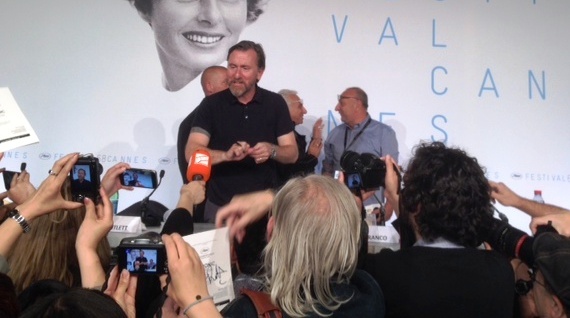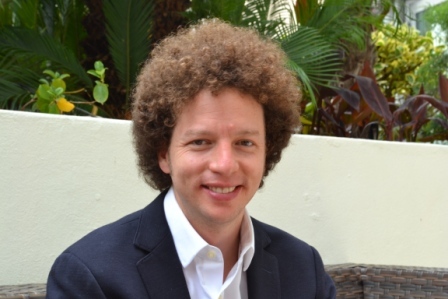Tim Roth gives an outstanding performance in Michel Franco's new film Chronic, which just premiered at Cannes, as a male nurse who bizarrely goes beyond the call of duty to care for his dying patients. The film follows him as he takes care first of one patient (until the funeral), and then another -- and then another -- each time scrupulously washing the patient's back, with dedicated strokes, or encouraging him or her to speak about their lives. The nurse even goes so far as to buy an architecture book for one of his crotchety patients (an architect), and to visit one of the homes he designed. What is odd is that his care for his patients is absolutely deadpan -- and he, for an unfathomable reason, deeply depressed.
Tim Roth in person -- whom I saw joking at poolside with a hotel woman who called to him from her balcony -- is quite opposite from the role he plays. Lively, funny ("I love you too!" he called up to the woman at the balcony) and jocular. In the film, he is brooding, with his body tensed up like that of a former high school wrestler, who never got out of the pose. At the press conference, in fact, the actor remarked that: "For this role, I stripped myself bare. I played the nurse very quiet. I didn't want to distract from him, so I tried to keep myself low."
Chronic is a riveting film -- because of Roth -- and may very well win an award tomorrow night. But it is tough to watch, just as it is tough to be at the hospital bedside of a patient in chronic pain (one after another). There is no joy in the movie, and very little warmth. The other characters in the film (mostly family members of the patients) have little affect: Perhaps because they are dealing with a loved one's chronic illness (as the director noted at the press conference), but more likely because the director has chosen to put the spotlight on how estranged we human beings are from each other. The nurse, in his strange dense way, is the most "human" character. The others, in contrast, seem cold, rushed, or indifferent, and speak to each other in monotone.
A sense of mystery is what propels the story: Something traumatic happened in this nurse's past that spurs him in his overzealous activity. The mystery works: We are gripped to the "cold" story before us, one that (plot spoiler) ends up as icy as it begins.
I went to meet the young Mexican director, Michel Franco, to ask him why he created such a disturbingly bleak universe.
Why did you make a film in which humans seem not to care about each other? Is this how you see people?
I should not be very pessimistic as in my personal life I am lucky with my friends and family. My family came all the way from Mexico to be here with me. Nevertheless, I am intrigued by how we can be well-educated and civilized, and still have trouble communicating. Humans are complicated; we always make mistakes with each other. It is the same pessimistic view that you will find in my other films.
Almost all of the relationships in the film are cold, except for the one at the end, with Tim Roth and the cancer patient "Martha." Can you comment on Martha?
Oh yes, Martha. It's true they end up being close. Still, I don't know if Martha is manipulating him. We don't know if from the very beginning, she is trying to manipulate him.
Really! I didn't see her this way.
It's not clear. I will have to see it again and tell you what I think of Martha. Every time I see the film I think differently about Martha. I am suspicious of people's motives. We all have our worries, and our minds are complicated, and even if we love each other, we harm each other...
Some viewers will be disappointed that this film has no arc of triumph, no evolution. In a conventional film, a protagonist who begins a film depressed will evolve and, by film's end, have a surprising realization or recovery.
My film is close to real life, in that life rarely has that arc where everything changes and is better at the end. I like movies that do not solve the conflict, because when the conflict is solved, it satisfies the spectator and all is finished, forgotten in an hour. But if the conflict is not solved, like in my film, you are forced to keep thinking about it. Usually in a film, the audience is told from the beginning: Be prepared for the final [triumphant] end. I just shot my film in a way I like: subtle. I don't give things to the audience. I feel like the audience is tired with being disrespected.
You say life has no arcs. Do you really believe that?
When my professional life is going well, I am happy, and then I am down again. Yes, I have those kinds of professional arcs.
What about non-professional arcs? How about going through an emotional upset or loss, and then changing through it, or achieving some kind of resolution? This is a way many people approach tragedies...
I would say no, that does not happen. Most things you have to accept them and move on, if they are really bad. You don't change them and it is better to accept and move on. These people who believe in change are in therapy for ten years or always reading a book about how to be happy, but then they fall into another problem. I am more simple. As long as there is no trouble in my life, I focus on work.
I am going to guess that you are an atheist: and think there is nothing after death.
Right. I do think there is nothing after life. Death is scary. It is a horrible thought, pessimistic, but it is good to embrace that thought because if you accept it, it makes you make the most of your life.
One critique of your film: The father/daughter relationship is not quite believable. The Tim Roth character sees his daughter after many years of absence, and she just casually welcomes him back with a, "Nice to see you!"
True, but I wanted to make the father-daughter story as small as possible. With the daughter, I just wanted to make a point that the nurse is welcomed back easily by his [estranged] family, so even that cannot explain his depression. The real problem for him is that he cannot cope with life; it's not a matter of external factors.
Where did you get the idea for your story?
My grandmother got sick in 2010, and she was tied to a bed for several months before she passed away. I was very moved by the angel who took care of her. I asked this nurse, Beatrice, how many years she had been doing this! The work kept her down. She was depressed. Yet, she said she liked her work. She was always thinking about her patients. Nurses are close to certain matters that we try to escape; they are brave and they do it. My film is a character study.
The reason I chose to make it a male nurse is because of Tim Roth. I won the Certain Regard with my film After Lucia a couple years ago [2012]. Tim Roth was on the jury. He came up to me after the awards ceremony and said, "Let's work together!" I told him I was making a film about a nurse and he said, "If you make her a male, I'll be that nurse!" And so I did.
Does the fact that you are from Mexico -- a very unsettled place right now -- influence your filmmaking and choice of subjects?
Mexico has always been a very complicated society, not just now. It is a really troubled country [with corruption etc.] which is why we have good film directors -- which is why Greece has interesting film directors now. I like chaos. My first movie really comes out of that Mexican context; my second film has some of it. The third was shot in the streets of Mexico, with homeless people. My beginnings were tied to Mexican reality, but now I am growing out of it, and becoming more personal.
You are a Jewish Mexican, and as you tell me, your mother is Israeli. Do you feel connected to your Jewish roots?
Culturally, I do (laughs.) Perhaps I have some of the pessimism.


